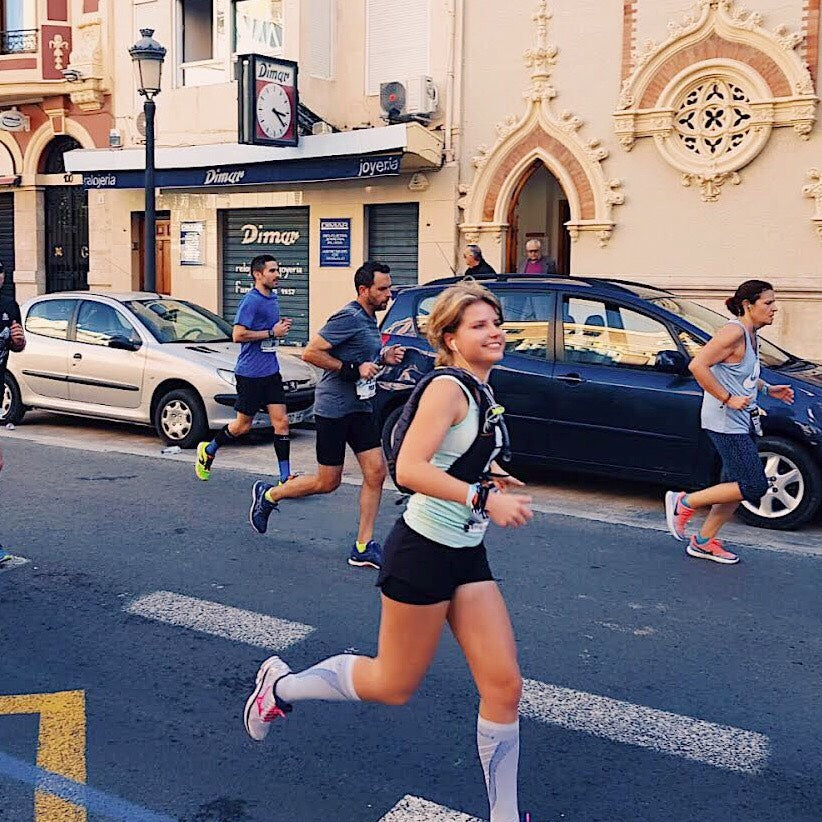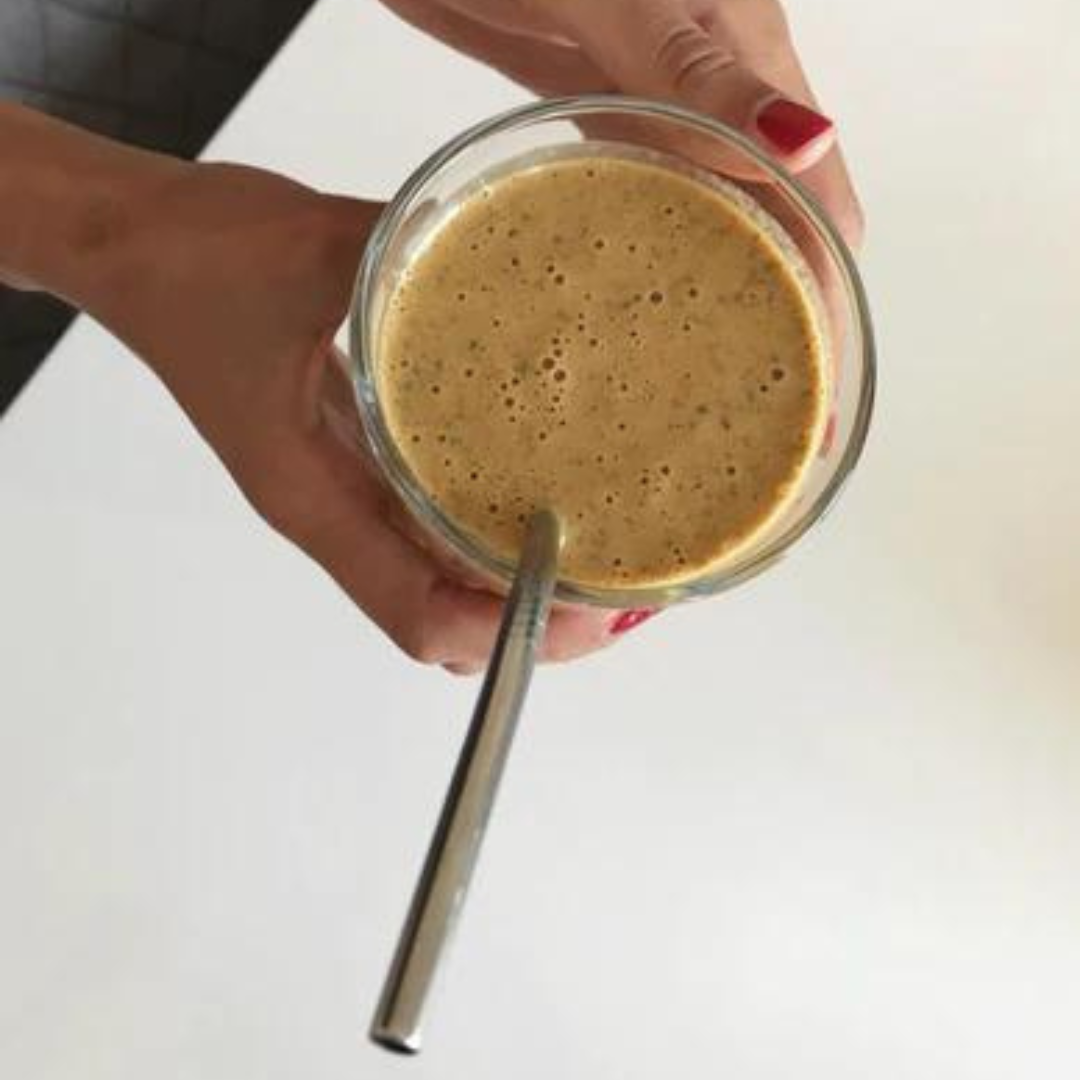This week on #highfatstory... Lotte Damen! Lotte is a certified Dietitian, vivid runner, entrepreneur, and a super cool girl. She combines Standard Keto with endurance training and will share her tips to get the best out of your runs, challenges and much more in this interview.
So, enough of introduction... let's begin!
Hi Lotte, thank you so much. Let's start by sharing a bit about yourself and what you do?
Hi! My name is Lotte Damen, a dedicated new graduate Dietitian from The Netherlands. During my 5-month internship at The Noakes Foundation in Cape Town, I learned about many aspects and the health benefits of a Ketogenic Diet, and a whole new world opened up. Before starting my internship, I was a bit skeptical about this approach, to be honest. Like all other Nutrition & Dietetics students, I had always been taught that carbohydrates are the most important energy source of the human diet and for endurance performances.
After I got back from my internship, I realized following a Keto Diet here was not as common as in South Africa. Nowadays, more people and more dietitians are getting into it and seeing amazing results luckily. With an increase in popularity, and people labelling a Keto Diet as hype or the best diet for weight loss, I felt it was my responsibility as a Registered Dietitian to provide evidence-based information and advice since there is a lot of incorrect or conflicting information out there. This, to make people aware of how a well-formulated Keto Diet looks like and how to implement it safely.
And so Lots of Keto was born! I am working hard to create an all-in-one website where people can find meal plans, recipes, and the most recent Keto news & articles. In addition, I provide 1-on-1 Keto nutrition advice and coaching, meeting someone's individual nutritional needs. There is no one size fits all approach when it comes to nutrition, and this also applies to Keto.
And how did you start the Keto journey yourself?
To be honest, I wasn't following the Keto Diet myself during my internship period. I was way to busy enjoying my time with other interns, haha. If I would have known it wouldn't even be that difficult to start, I would have definitely been on it earlier! I did a lot of trail running in Cape Town, but still all on a higher-carb diet. It would have been very interesting to find out about the differences between doing a higher-carb and low-carb diet on my performances.
Once I was back in The Netherlands, I decided to go all-in and signed up for my second marathon. This time, I would run it on Keto, in a fat-adapted state! I had already run a marathon one year ago, which was also still on a higher-carb diet. I was very curious if I would experience any differences in endurance performances compared to last year's run (here you can read how amazing it went!). Since I really had a goal in mind, and I had extensively developed my knowledge in a Ketogenic Diet, it wasn't difficult for me to really get started.
That's awesome! Some people don't believe that you can do wonders while fueled by fat... and what has changed in your life since you’ve been on Keto?
The first week of doing Keto was challenging! I never thought I would be able to give up on bread, and I felt pretty lethargic. Luckily, after a couple of weeks, I started to notice the benefits I was hoping for. The most striking positive differences I started to experience were increased energy levels, the mental health benefits, feeling more balanced, and increased satiety in between meals. I used to be a person who ate every 2 hours, had a hard time getting out of bed early, and was feeling unbalanced sometimes.
Eating Keto makes me more conscious of the food and meals I eat at the moment since I consume just 2-3 meals a day. Being more aware of what you eat is an amazing feeling, and it makes me enjoy my meals to the fullest. I truly believe Keto can charge your mindfulness, and that stable blood sugar levels can improve your mood and mental health for the better.
But the thing that has changed most, is definitely how I experience my runs. Now I'm fat-adapted, I can easily run in a fasted state. Mostly, I even run faster than on days I run after a meal. Before doing Keto, my body still relied mainly on carbohydrates, and I could really feel the energy spikes & dips during longer runs. I also experience less muscle soreness and faster recovery!
Now, what we've all been wondering... how do you fuel yourself on Keto and what “type” of Keto do you follow?
I follow a Standard Ketogenic Diet since I believe this type of diet is the best approach for long-distance runners. I don't track macros and I don't count calories, since I know by heart how many grams of fat / carbs / protein I daily eat, and I eat until I feel satisfied. I consume about 75-80% fat, 15-20% protein, and 5% carbs. In addition, I consume at least 30 grams of fiber each day and aim to drink 1,5 - 2 litres of water.
The fats I consume mostly come from whole foods such as avocados, grass-fed butter, nuts such as macadamias & pecans, (chia) seeds, olives, coconut oil, extra virgin olive oil, and fatty fish. Some of the products I named also provide protein, but of course, eggs can't be forgotten (2-3 per day). I try to limit the intake of processed products such as cheese, and full-fat dairy (1 serving size a day). The problem with full-fat dairy products is that they still contain quite a bit of milk sugars. And of course, I prefer to get my carbs and fiber from non-starchy vegetables, at least 300 grams per day! My favourite veggies are spinach, kale, broccoli, cauliflower, zucchini, and bell peppers. If I feel like I need some extra fiber, I add chia seeds or psyllium husk to my meals.
I eat when I'm hungry, and not on fixed times. Sometimes this results in a fast of 16 - 24 hours. There are weeks in which I fast several times, but I also have weeks during which I feel my body needs extra fuel because I train more for example. Of course, I also have my weak moments, and days on which I consume unhealthy sugary foods. To get back on track and back in ketosis, I simply fast the next day. I only started with intermittent fasting after a couple of months on Keto, once I felt I was fully fat-adapted. Now I can easily eat around 50 grams of carbs per day, and still be in ketosis. After a day on which I consume way more than that, I am mostly back in ketosis within 2 days.
Just because this flexible approach works for me, it doesn't mean it's the gold standard of course. Some people really prefer to have a structured plan, and that is totally okay! I think the most important part of following a Keto Diet, is making conscious decisions based on what your body needs at that moment. And believe me, this can change day by day.

Can you give more details on how you use Keto for endurance? Any tips for other runners out there?
I run longer distances on flat surfaces, so I train my body to become extremely efficient in burning fat for energy. Running in a fasted state also contributes to this, since this depletes the stored muscle glycogen, and my body turns to stored fat for energy. I basically train my body to burn fat. Luckily, human bodies can store a nearly limitless amount of energy in the form of stored fats! During my last marathon on Keto, I only ran on electrolytes & water. My average speed was extremely steady and I even finished stronger than I started! During this event, I could really notice the benefits of implementing fasted runs in my training schedule.
Endurance runners can really benefit from following a Keto diet if it's done the right way! The most important thing to realize is that it takes time to become fully Keto and fat-adapted. It's not something you can decide the week before a race for example. Once you become more efficient in burning stored fat for energy, this can result in a lower body fat percentage, a leaner body, and a better power-to-weight rate. In addition, your body has to rely less on stored muscle glycogen, and you might experience fewer energy spikes & drops. Also, you will be less likely to 'hit the wall' or experience 'bonking' at the end of the race. Simply, because your body is using fat as the main energy source and preserves glycogen stores.
So how to get started? Firstly, it's important to develop the right mindset. You may be sceptical about this approach, since traditional advice tells you to carb-load and consume enough carbohydrates before, during, and after a race. Therefore, it's important to think about the health benefits you aim to achieve on a Keto Diet. Having your 'why' clear, makes it easier to turn your thoughts into 'actions'. If you want to run a race on Keto, start at least 6 months before! Then, it's up to you if you prefer to go cold turkey or slowly decrease the amounts of carbs you eat on a daily basis.
So how to get started? Firstly, it's important to develop the right mindset. You may be sceptical about this approach, since traditional advice tells you to carb-load and consume enough carbohydrates before, during, and after a race. Therefore, it's important to think about the health benefits you aim to achieve on a Keto Diet. Having your 'why' clear, makes it easier to turn your thoughts into 'actions'. If you want to run a race on Keto, start at least 6 months before! Then, it's up to you if you prefer to go cold turkey or slowly decrease the amounts of carbs you eat on a daily basis.
Start with a Standard Keto Diet, and restrict your carb-intake until you consume max 30 grams per day. Try to take it a bit slower in the first weeks, and allow your body to adapt. You might experience a dip in performance until you are fully Keto-adapted, but don't give up in this stage! Run slowly, and increase your distance and speed once you start to notice the positive effects on your energy levels. After one month, you can experiment with running in a fasted state. Keep in mind that there is not just one way to do it. The most important thing is to keep track of your performances, how you feel, and to experiment with the number of carbohydrates you can eat while still being in ketosis.
Do you or did you face any challenges on Keto (And how did you or try to overcome them)?
Eating with friends can be a challenge so now and then, but luckily my friends have been loving my keto recipes so far! In the beginning, I found it quite difficult to explain why I follow this lifestyle since it is still a controversial approach especially according to other dietitians. Following a Keto lifestyle is a fun journey, and it's about facing challenges, a matter of trial and error, and finding your own way. If I find out something doesn't work anymore, then I try another approach.
The beginning is always hard but we get there, experimenting is indeed the key to find your way through Keto. What’s the biggest message you would like to share with people interested in the Keto lifestyle?
Keto is it's not only a short-term diet to rapid weight loss, but it's a lifestyle in which you make consistent conscious decisions. It lowers your insulin levels in your body, and this can have many more health benefits than just weight loss. For example, lower insulin levels can greatly reduce the risk of developing insulin resistance, Prediabetes, and therefore Type 2 Diabetes. Besides this, people report increased energy levels, better mental health, lower bad cholesterol levels. More research is yet to come.
With every lifestyle change, it's important to think about sustainability over the long term. Don't see it as a free pass to over-consume on bacon & butter! Keto can definitely improve your mindfulness since it makes you more conscious of the food products you consume. A balanced nutrient-dense Keto diet consists of as little processed foods ass possible, and is rich in leafy vegetables, lean meats, fish, nuts, eggs, seeds, olive oils, grass-fed butter, and lots of water!
With every lifestyle change, it's important to think about sustainability over the long term. Don't see it as a free pass to over-consume on bacon & butter! Keto can definitely improve your mindfulness since it makes you more conscious of the food products you consume. A balanced nutrient-dense Keto diet consists of as little processed foods ass possible, and is rich in leafy vegetables, lean meats, fish, nuts, eggs, seeds, olive oils, grass-fed butter, and lots of water!
If you are thinking of starting a Keto Diet, always consult your doctor or healthcare professional. Some groups require special consideration, such as people taking medication or if you're pregnant / breastfeeding. I really want to address the fact that a Keto lifestyle is not the answer to all health problems. There are more factors that contribute to a healthy lifestyle, such as exercise, your genetics, your sleeping pattern, and if you experience any stress.
Thank you so much for all this clear info, Lotte. I think it's great to share these types of information to spread awareness on what is and what is not Keto. There's a lot of misinformation out there.
But now, tell us... What do you think of Keto Cacao and what is your favorite flavor?
As a runner, it is really difficult to find a Keto proof pre-run snack in The Netherlands that provides enough energy and fats and doesn't mainly consist of sugars & carbohydrates. Taking cheese on a run is not that convenient, as you will probably understand. Therefore, I was so happy to come across these bars. The best thing is that they contain MCT oil, since this type of oil is directly converted into quick energy, and skips the longer pathway through the liver. Chocolate combined with this energy source makes it the perfect snack before a long run. My favourite flavour is definitely hazelnut, I like a crunchy bite!
Thank you so much for sharing your story with us and Keto on!
For more info on endurance on Keto and other Keto related topics, you can visit Myndfuel. Lotte provides interactive 4-week keto kickstart programs that teach you to implement a well-formulated keto lifestyle in 4 weeks. On Myndfuel, you can invest in 1-on-1 personalized online nutrition advice, focused on a mindful approach to a low-carb living.
And don't forget to use the #highfatstory on Instagram if you want to share your journey with us.
Other blogs you might enjoy:




Leave a comment
All comments are moderated before being published.
This site is protected by reCAPTCHA and the Google Privacy Policy and Terms of Service apply.